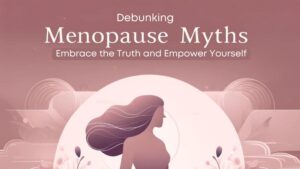Menopause is a transformative phase in a woman’s life, yet it often comes shrouded in misconceptions and myths. These misunderstandings can lead to unnecessary anxiety and fear. It’s time to separate fact from fiction and empower ourselves with knowledge. In this article, we’ll explore common menopause myths and unveil the truths behind them, supported by credible sources.
Menopause Marks a New Chapter of Relevance and Wisdom
Myth: Menopause Equals Old Age
Truth: Contrary to popular belief, menopause is not synonymous with old age. According to the Mayo Clinic, menopause can occur in a woman’s 40s or 50s, signaling the end of her reproductive years. However, it’s a natural transition and doesn’t signify the onset of old age.
Menopause is a Natural and Empowering Phase
Myth: All Menopausal Symptoms are Severe
Truth: While menopause can bring about various symptoms such as hot flashes and mood swings, not all women experience them in the same intensity. The North American Menopause Society emphasizes that symptoms can range from mild to severe and can be managed effectively with lifestyle changes and, in some cases, medication.
Women Remain Rational and Resilient During Menopause
Myth: Menopause Makes Women Irrational
Truth: Hormonal changes during menopause can affect mood, but they don’t render women irrational. A study published in the Journal of Women’s Health found that while hormonal fluctuations may influence emotions, women remain capable of rational thought and decision-making.
Menopause Experiences are Unique and Manageable
Myth: Hormone Replacement Therapy (HRT) is Dangerous for Everyone
Truth: Hormone Replacement Therapy (HRT) can offer relief from menopausal symptoms for many women when used appropriately. The National Institute on Aging states that while HRT may have risks, such as an increased risk of blood clots and breast cancer for some women, it can be beneficial for others when prescribed at the right dose and duration.
Hormone Replacement Therapy Can Be Beneficial
Truth: Menopause is a natural biological process, not a disease. The American College of Obstetricians and Gynecologists emphasizes that menopause is a normal phase of life that every woman goes through. Understanding this can help alleviate the stigma surrounding menopause.
Myth: Menopause is a Disease
Menopause is a Holistic Transition
Myth: Menopause Experiences are Uniform and Severe
Truth: Every woman’s experience with menopause is unique. While some may face severe symptoms, others may have milder or more manageable ones. The Office on Women’s Health emphasizes that the intensity and duration of menopausal symptoms vary from person to person.
Sexuality Thrives Beyond Menopause
Myth: Menopause Signals the End of Sexuality
Truth: Menopause does not mean the end of sexual activity or desire. The American Sexual Health Association highlights that many women experience heightened sexual satisfaction post-menopause due to decreased anxiety about pregnancy and newfound sexual freedom.
Menopause Conversations Build Community
Myth: Women Should Suffer in Silence
Truth: It’s essential for women to talk openly about their menopause experiences. The British Menopause Society stresses the importance of seeking support from healthcare professionals and engaging in conversations with peers to alleviate the emotional and physical burden of menopause.
Menopause is a Natural Life Transition
Myth: Menopause is Just a Physical Transition
Truth: Menopause encompasses not only physical changes but also emotional and psychological transitions. The Cleveland Clinic emphasizes the holistic nature of menopause, highlighting the importance of addressing emotional well-being alongside physical symptoms.
Your Symptoms are Real and Valid
Myth: Menopause Symptoms Are All in Your Head
Truth: Menopause symptoms are real and valid. The American Psychological Association emphasizes that while hormonal changes during menopause can impact mood and cognition, the symptoms are not imaginary. Seeking support and treatment for menopausal symptoms is essential for overall well-being.
Menopause is a transformative journey, and debunking common myths surrounding it is essential for women’s empowerment and well-being. By separating fact from fiction and understanding the truths behind menopause, women can navigate this phase of life with confidence and grace.
Each woman’s experience with menopause is unique, and while it may come with challenges, it also presents opportunities for growth and self-discovery. Seeking support from healthcare professionals, engaging in open conversations with peers, and staying informed about menopause are crucial steps in this journey.
Let’s embrace the truth about menopause and empower ourselves and each other to navigate this transition with resilience and positivity.
Stay informed, stay empowered, and let me guide you through this transition. I suffered through menopause so that you don’t have to. Schedule Now

View comments
+ Leave a comment